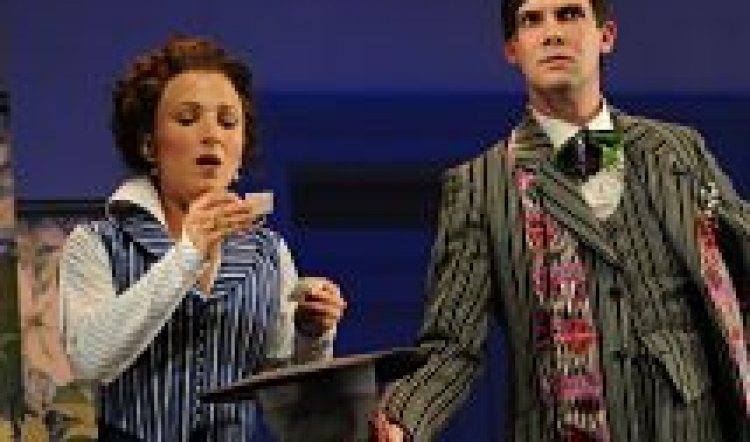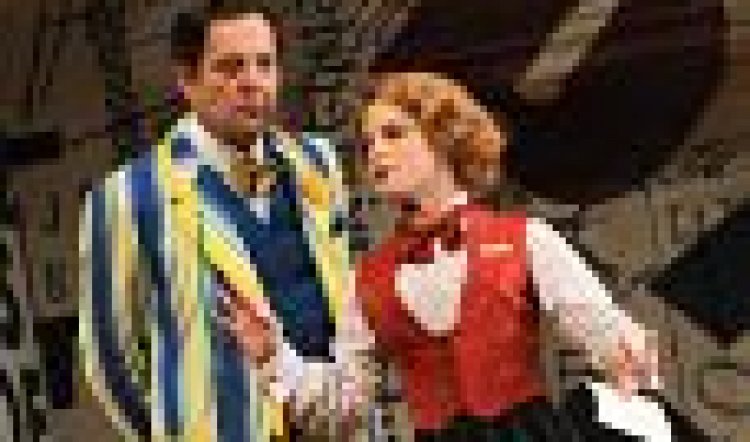
Travesties
O lucky people! Watching Richard Cottrell’s new production of Travesties is like body-surfing a huge, bubbling, boisterous, unpredictable, possibly dangerous and always exhilarating rolling wave for two unforgettable hours. It threatens at any moment to break and overwhelm with myriad words, ideas and comedic challenges, but it never does. At the end, you’re deposited on the beach, safe, spluttering with laughter, wonder and delight. It’s one hell of a ride.
The key to this revival of Tom Stoppard’s 1978 masterpiece of unreliable memoir, comedy and language is, in this instance, its director Richard Cottrell. If ever a play and director were meant to be together it’s he and Travesties. Cottrell’s career in theatre is immense and not merely in terms of longevity. He has directed, at the highest level, virtually every play of merit either in the UK, Australia or north America, since his name began appearing in programs in the mid-60s, and his successes are legendary.
He has brought this wealth of lightly-worn knowledge and a treasury of experience to one of the most difficult – but therefore potentially most rewarding – works of the 20th century. To pull off the dense laugh-leviathan known as Travesties the cast and director must have an acute understanding and awareness of its complex layers and how they must mesh perfectly. The layers are the text, movement, physical nuance, the playing space and that thing so easily called “comic timing” but which is the difference between laughter and silence.
Although these elements are the basic stuff of all theatre, for the cast of Travesties, they are heightened to the point of existential terror. Get a step or an eyebrow wrong, pause in the wrong place, or try a new bit of unplanned business, and the house of cards collapses into a melange of incomprehensible verbiage known as failure.
This production does none of that. The cast is impeccable, the set and costumes are splendid and the whole is even greater than the sum of its considerable parts. (Choreographer Pamela French, designer Michael Scott Mitchell, lighting designer Bernie Tan and costume designer Julie Lynch.)
Apparently Stoppard saw Jonathan Biggins in Ying Tong last year (also beautifully directed by Cottrell). He must have breathed a sigh of relief that our most brilliant comic goose was going to play Henry Carr, the minor British consular functionary whose grandiose memories are at the centre of Travesties.
Stoppard would be as thrilled by the other actors too: Robert Alexander, Blazey Best, Peter Houghton, Rebecca Massey, Toby Schmitz, Wendy Strehlow and William Zappa. They are among Australia’s very best and they’re all at the top of their form – possibly higher than they’ve been before, under Cottrell’s influence.
Stoppard was already a major star when Travesties opened at the Aldwych Theatre in London in 1974. Audiences in the UK and around the world had already been dazzled by Rosencrantz and Guildenstern Are Dead, The Real Inspector Hound and Jumpers. That he might conjure up yet another play of originality and brilliance didn’t seem possible, but it was and more than 30 years later, it still is.

Stoppard loves playing around with history, memory and the mesh of lies in between. He also loves comedy, literature, games and the intoxicating effect of mixing the whole lot together – at his best he’s an alchemist. The ingredients of Travesties are Henry Carr, a minor British consular official in Zurich in 1917. There he met James Joyce who was working in the local library on what would become Ulysses; also in the library the Dadaist poet Tristan Tzara was falling in love with Carr’s younger sister Gwendolen, while in another part of the library Lenin was writing a revolutionary polemic aided by the passionately infatuated librarian Cecily. And Carr’s long-suffering butler Bennett was a Bolshevik spy when not serving tea and muffins to his master.
Joyce was also the manager of the local expat amateur theatricals; when the company staged The Importance of Being Earnest Carr was called upon to play Algernon. If you’re bemused it is as nought compared with the hock-addled and sliding-towards-senility reminscences of the memoirist, Henry Carr.
“Zurich during the war,” muses Carr with utmost pomposity. “Refugees, spies, exiles, painters, poets, writers, radicals of all kinds – I knew them all – I learned three things in Zurich during the war. I wrote them down. Firstly, you’re either a revolutionary or you’re not, and if you’re not you might as well be an artist as anything else. Secondly, if you can’t be an artist, you might as well be a revolutionary. I forget the third thing.”
Long before it became fashionable, Stoppard had caught on to the unreliability of memory: Carr was indeed a consular official in Zurich and Joyce, Lenin and Tzara were also trapped there for various reasons of war and history. But not all at the same time and never in the same place! And the misses Gwendolen and Cecily did not exist outside Wilde’s play, while the butler Bennett was actually the British consul and probably not waiting for the revolution.
Travesties is a marvellous flummery and the Sydney Theatre Company has caused it to be marvellously done. It’s a joy and a privilege to watch it.
If co-artistic director Andrew Upton could be persuaded to stop channelling his predecessor in giving self-consciously graceless and grudging opening night speeches it would have rounded off a brilliant night. As it is, the man to speak simply, coherently and charmingly about art, partnership and appreciation of the Travesties company was sponsor HWL Ebsworth’s rep. Come on Andrew, it will really be the dawn of a new era for the company when you’re the witty, generous and articulate fellow on the podium as you are off it. Why pretend otherwise?.



